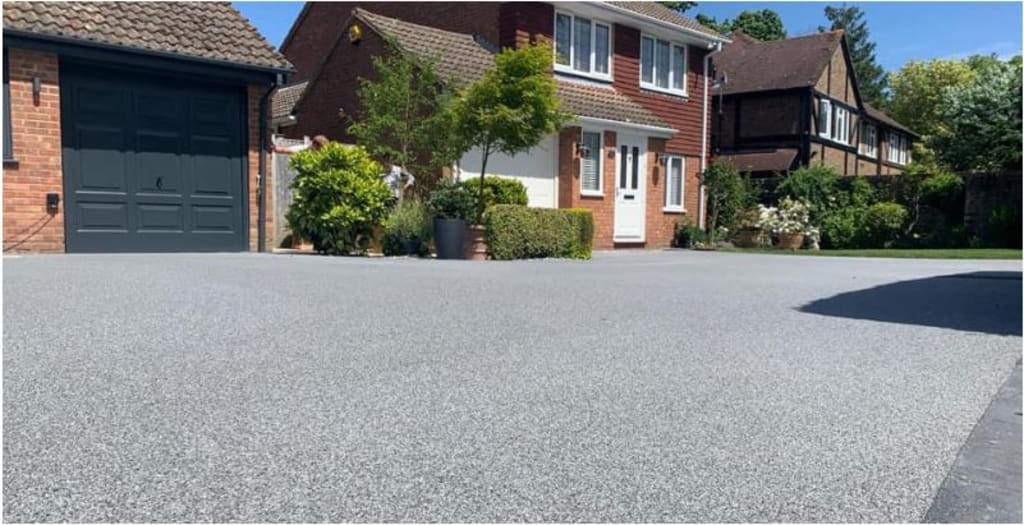Troubleshooting Resin-Bound Driveway Problems: A Comprehensive Guide
Guideline

Resin-bound driveways are a popular choice for homeowners because of their durability, permeability, and aesthetic appeal. However, like any type of driveway, resin-bound driveways can develop problems over time. If you're experiencing issues with your resin-bound driveway, it's important to troubleshoot the problem as soon as possible to prevent further damage and ensure the longevity of your investment.
Here's a comprehensive guide to troubleshooting common resin-bound driveway problems:
Cracking: One of the most common issues with resin-bound driveways is cracking. This can be caused by a variety of factors, including:
Insufficient surface preparation: If the subbase was not prepared properly before the resin was applied, it can cause the surface to crack over time.
Heavy loads: If your driveway is subjected to heavy loads, such as large vehicles, it can put stress on the surface and cause it to crack.
Freezing and thawing: In areas with harsh winter weather, the repeated freeze-thaw cycles can cause the surface to crack.
Read more: DIY or Hire a Pro? The Ultimate Guide to Resin Bound Driveways
To troubleshoot cracking, you'll need to identify the underlying cause and address it accordingly. For example, if the cracking is due to insufficient surface preparation, you may need to remove the resin and re-prepare the subbase before reapplying the resin.
Discoloration: Over time, resin-bound driveways can become discolored, which can detract from their aesthetic appeal. Some common causes of discoloration include:
Exposure to UV rays: Over time, exposure to the sun's UV rays can cause the resin to fade or yellow.
Chemical exposure: If the surface is exposed to chemicals, such as oil or gasoline, it can cause discoloration.
To troubleshoot discoloration, you may need to reapply a UV-resistant sealer to protect the surface from further damage. If the discoloration is due to chemical exposure, you may need to remove the affected area and apply new resin.
Staining: Another common issue with resin-bound driveways is staining, which can be caused by a variety of factors, including:
Organic matter: Leaves, dirt, and other organic matter can stain the surface if they are not removed promptly.
Oil or grease: If your car leaks oil or grease onto the surface, it can cause staining.
Water pooling: If water pools on the surface for an extended period of time, it can cause staining.
To troubleshoot staining, you'll need to identify the underlying cause and address it accordingly. For example, if the staining is due to organic matter, you may need to sweep the surface regularly to remove debris. If the staining is due to oil or grease, you may need to use a degreaser to remove the stain.
Potholes: If you notice potholes in your resin-bound driveway, it's important to address the problem promptly to prevent further damage. Some common causes of potholes include:
Heavy loads: If your driveway is subjected to heavy loads, such as trucks or construction equipment, it can cause the surface to crack and form potholes.
Poor drainage: If your driveway is not properly sloped or does not have adequate drainage, it can cause water to pool and erode the surface, leading to potholes.
To troubleshoot potholes, you'll need to identify the underlying cause and address it accordingly. For example, if the potholes are caused by heavy loads, you may need to reinforce the subbase or limit the weight of vehicles using the driveway. If the potholes are caused by poor drainage, you may need to install drainage solutions, such as a French drain or permeable pavers.
Loose aggregate: Resin-bound driveways are made up of a mixture of aggregate and resin. Over time, the aggregate may become loose or dislodged, which can detract from the aesthetic appeal of the surface and compromise its durability. Some common causes of loose aggregate include:
Insufficient resin: If there is not enough resin in the mixture, it can cause the aggregate to become loose over time.
Poor mixing: If the aggregate and resin are not mixed properly, it can cause the surface to become uneven and the aggregate to become dislodged.
Read more: Resin Bound Kits: An Eco-Friendly and Sustainable Choice for Your Next Project
To troubleshoot loose aggregate, you may need to apply a new layer of resin and aggregate to the affected area. It's important to ensure that the new layer is properly mixed and applied to prevent the same issue from recurring.
Uneven surface: If your resin-bound driveway is uneven or has high and low spots, it can detract from its aesthetic appeal and create safety hazards, such as tripping hazards. Some common causes of an uneven surface include:
Insufficient subbase preparation: If the subbase was not properly prepared before the resin was applied, it can cause the surface to become uneven over time.
Inconsistent mixing: If the resin and aggregate are not mixed properly, it can cause the surface to become uneven and create high and low spots.
To troubleshoot an uneven surface, you may need to remove the affected area and reprepare the subbase before applying a new layer of resin and aggregate. It's important to ensure that the new layer is properly mixed and applied to prevent the same issue from recurring.
Conclusion
In conclusion, troubleshooting resin-bound driveway problems can be a challenging task, but it's important to address any issues promptly to prevent further damage and ensure the longevity of your investment. By identifying the underlying cause of the problem and addressing it accordingly, you can restore your resin-bound driveway to its former beauty and functionality. If you're not comfortable troubleshooting the problem yourself, it's important to hire a professional contractor who has experience working with resin-bound driveways. With careful attention to detail and proper maintenance, you can enjoy the many benefits of a beautiful and durable resin-bound driveway for years to come.
About the Creator
Neck Akila
My specialty is combining research-backed strategies to create marketing copy that resonates with readers and drives conversions





Comments
There are no comments for this story
Be the first to respond and start the conversation.